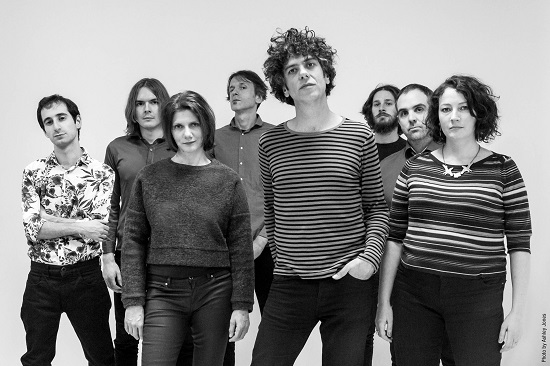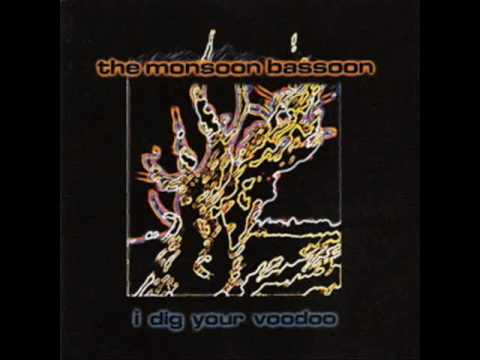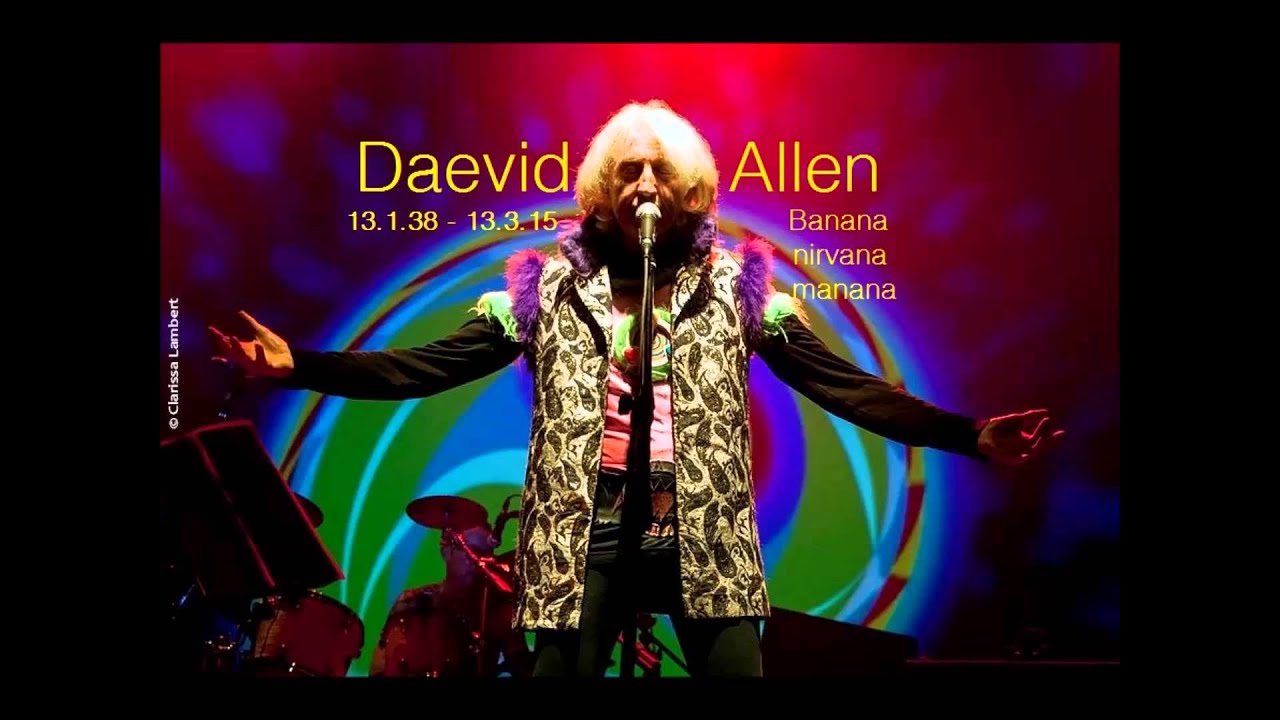Born on December 5, 1971, of English and Iranian descent, guitarist, composer, record label owner and radio broadcaster Kavus Torabi is a man of many bands and guises. From the Plymouth-based thrash metal of Die Laughing, through the psychedelic math-rock of the Monsoon Bassoon and his current main vehicle, the orchestrated psych-rock octet Knifeworld, Torabi has always pushed against the boundaries of genres others attempt to pigeonhole him in. As well as his hugely original own work, Torabi has worked with bands such as Chrome Hoof, Guapo, Cardiacs and Gong, which he continues to front following the death of Daevid Allen.
Most recently, his DJ sets with snooker legend and ‘difficult music’ fan Steve Davis, whom he co-presents the Interesting Alternative Show on Essex-based radio station Phoenix FM, have taken flight, aided by a recent appearance at the electronic music festival, Bloc. Here, Torabi discusses ten points in his musical career, a journey that has been defined by both successes with his own projects, and in some respects guided by the ‘secret brotherhood of underground musicians’ who had influenced him as a younger man, and whose influence he later found himself in the position of being able to repay.
The Monsoon Bassoon
Things happened so quickly for us. We had this real arrogance, we were convinced we were the best band in London and for a while, sometimes we were. Having moved from Plymouth, we were all on the dole and living together, so we could spend all day, every day, rehearsing, it felt like being in a cult. We were incredibly ambitious. We used to do really full on gigs, chucking ourselves around and diving into the drum kit. I suppose it came from loving Henry Cow and Sonic Youth in equal measures and wanted to be as extreme as we possibly could, whilst still being melodic. Then Tim [Smith] started coming to the gigs and loving it. I started working for Cardiacs and being part of that nexus, changed everything. We did some recordings with Tim, set up our own label and started putting out 7”s.
Once we did ‘Wise Guy’, it defined the new sound of the band. Having the three consecutive singles of the week in the NME was a huge boost. I think that stands as pretty much a unique achievement. As far as I know, even the Smiths, or the Jam never got three singles of the week in a row. We wanted everything we did to be original and to never repeat ourselves. Towards the end, I don’t really know what happened, perhaps it was eight years of crushing poverty. We were working on a second album with Paul Epworth but I wasn’t happy with the mix. There were lots of reasons we split up, but basically Jamie [Keddie] left and I thought, ‘I don’t want to continue this with a different drummer.’ I thought that Dan [Chudley] and I would get another band together and in six months time, we’d carry on from where we left off, but it turned out to be not like that.
Cardiacs
In the early 2000s, [Cardiacs guitarist] Jon Poole was busy doing Wildhearts and Tim had the idea of doing the early stuff that was really badly recorded and do three gigs where we played all that material – about 36 songs. Tim asked if I’d like to stand in. There was so much stuff to learn – 36 songs in three months. As proof of this guy’s song writing genius, this is material he was writing when he was 16. The structures and the chords and everything, are so much better than the stuff he was influenced by. It wasn’t until after the 2007 tour, which as we know turned out to be the last one, that we started working on new stuff, which is what became LSD.
It was an extraordinarily interesting and brilliant time for me because we’d already talked a great deal about what the plan was for the next few years for Cardiacs. We were going to make a film. Tim and I were planning out loads of treatments and scripts. Tim wanted to share the burden of Cardiacs a bit with someone and I was more than happy to do that. The way things stand, the album is nearly done but needs vocals and eyebrows and some of them need a few other touches. What there is does sound great but there’s far more stuff completed that hasn’t come out yet, that needs to come out. Tim is a perfectionist, and rightly so. Because his melodies make so much sense of everything, it would be ridiculous to put out these recordings, as exciting as they are, without the melodies. We have talked about people who Tim would approve of adding vocals, under his direction. I think Tim just wants to be well enough to really be producing it. I think his big drive at the moment is to finish off things that were started. There are a lot of loose ends that need tying up.
Knifeworld
Knifeworld was very much the post Monsoon thing for me. It was a way to try and become a composer or songwriter in my own right. I’d written this solo album which I called Knifeworld and I needed a band to play it. At the time I was playing with Chrome Hoof briefly, so I got the keyboard player Emmet [Elvin] and Chloe [Herington] involved. Eventually things started happening in London and we expanded to an eight piece. For the second EP, Chloe had overdubbed all these parts and our bass player, Charlie, said, “Maybe we could get in a horn section just for the next few gigs, to show off how great all these parts are.” Of course, once I’d heard this full eight piece band playing my tunes, I didn’t want to go back. Then it became a challenge, to write music specifically for this eight piece band.
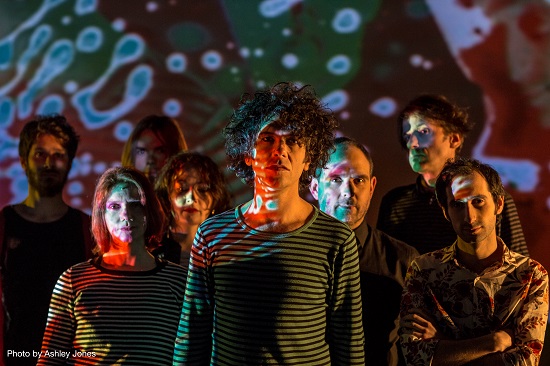
From The Unravelling onwards, Knifeworld started becoming incredibly personal. I started writing about what had happened to me and those around me. Because I’d always shared a band with someone else, I always felt very self conscious about talking about feelings and personal stuff but with Knifeworld I felt like I could be. So then I started being really gushing, I made that album about Tim, The Unravelling, and the new one about the death of Nick Marsh [from Flesh for Lulu] and Daevid Allen and my friends Justin and Mike from Plymouth. So this one became kind of the death album. I hope though that I’ve managed to wrangle some kind of optimism out of the process. You have to, all life is both. I think it’s important to know which side is up. Unless you’re in space of course. In space there isn’t any up or down. I think this time, I just wanted to make something that is what it is and not to have to deliberately put in these side alleys or half turns just to confuse people. The great thing, having done that is that the next Knifeworld album is going to be different again. The next record is gonna be the big, sprawling Steve Reich Desert Music meets Swans The Seer. I really want to get into repetition.
Guapo
Guapo and Monsoons used to play together back when we first started. At the time they were more a noise rock two-piece, bass and drums kind of like Ruins or something. When Daniel [O’Sullivan] joined, I went to see them live at what was the Buffalo Bar they were doing Five Suns, a full-on, forty minute prog piece, to like 80 or 100 people, keyboards, bass and drums and they had a gong. This was the first time they blew my mind. Afterwards I said to them, if you ever need to get a guitar player, you have to get me because believe me, there is no one else in this city who gets where you are coming from like I do.
About 2005, I got a call from either Dave or Daniel, saying that they were going to do a version of Guapo with two drummers, Charles Hayward and Dave Smith, we want you as our guitarist and Mike Patton’s going to sing. They were on Ipecac, so I guess that’s how that suggestion came about. I said OK, I’m in, obviously. They gave me some stuff to learn and in the end, although it turned out that Charles couldn’t do it, I’d already had this rehearsal with them and it sounded magic, so I said, let’s just do it anyway. In the mid-2000s, it was very much a time when bands like Fantomas, Melvins, Sunn O))), Neurosis, seemed to really be happening and Guapo were like, maybe a tier down, so we were always busy. It was very different to what I’d been doing with Cardiacs, because there was a lot more improvising involved. Because so much of my stuff is very rehearsal intensive, it was great in Guapo to have this music where 60% of it is composed but 40% is improvised. When you’re going out and you’re playing like 12 gigs in a row, by the end of those gigs, the material just sounds completely different. We’ve become much more of a recording band now. We haven’t done the same extensive touring we used to when I first joined. We have a gig coming up at Cafe Oto in October with the brilliant Upsilon Acrux [LA based ‘brutal prog’ band].
Believers Roast
I started the label initially, just to have a platform through which to release my own stuff. However, because of the Dickensian labyrinth that constituted Cardiacs business channels, the Alphabet Business Concern, there was a time when they couldn’t release any new CDs. At the same time, some of their records were going for £300 on ebay. Which is good in a way, but of course Tim wasn’t seeing any money from it. So Bic [Christian Hayes] had this idea of doing a tribute album so we could invite people to do interpretations of his music. We had all the usual Cardiacs satellite bands, but then we also got people like the Magic Numbers and Steven Wilson [Porcupine Tree]. Bic shopped it around some labels, but they all wanted to take a percentage, so we put it on Believers Roast.
Once I’d done that, I thought, why not put out some of my friend’s records, though it has to be something I’m really into. It would be an insult to a boutique label to call it that, it’s very small. But I credit myself with good taste at the very least. The record I thought that would make me famous was Exquisite Corpse. I had the idea of making a musical version of the surrealist game where you each draw a section and then fold it over, and because I was so privileged to have worked with so many great artists from all kinds of genres, and disciplines, wouldn’t it be great to call up all of these guys and see if they want to work on this. JG Thirlwell I just asked, because I was a massive Foetus fan. If you could frame an email, I would have done. He knew who I was and he’d been to see Cardiacs and Guapo. Weasel Walter, did my favourite track on the album. I got Laurie the Monsoons bass player, who now of course, is famous as Appleblim in the dubstep world. I got Khyam Allami the original Knifeworld drummer, who is now like the John Zorn of oud. I wanted to be on it as well, so I did my thing but I didn’t get to hear the entire thing until it was finished and of course, each artist only heard the last 20 seconds of the previous artist’s track and it worked out so beautifully. I really want to do another one. Imagine getting of the guys from Autechre and one of the guys from Iron Maiden on the same album, it could happen.
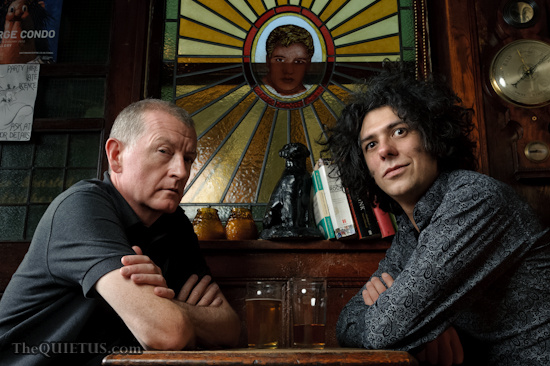
Steve Davis/the Interesting Alternative Show
We met in France, watching Magma in the Le Triton. I just went up and started chatting to him and we just clicked, he was really funny. The next night we went out and got a beer. Then the following week, Magma were doing a month residency and I was there with my wife, watching quite a few gigs in Paris and we ended up hanging out with him. All he wants to talk about is music, he’s obsessed. He’d written down loads of recommendations. I checked them all out, it was amazing. And I did the same for him. So he said, look I do this radio show, would you like to come in and be a guest. It was such good fun, he asked me to come back whenever I liked. Since then he and I have been doing this radio show together, on Phoenix FM. Occasionally we’ll have guests on. We’ve had Chris Cutler, Charles Hayward, we’ve had John and Luke from the Quietus, and Daevid Allen being on changed everything. As a result of this, we then started DJing at Redchurch Brewery and other places. It’s just a way of playing your favourite music to your friends. Then the guys at the Bloc festival asked us to DJ there. We played at Bloc and the BBC came along and made this short documentary on iPlayer about it. Since that, we’ve been getting loads of bookings. We’re doing 8 or 9 festivals this year. We’re doing Glastonbury.
Gong
A few years back, I got call from Steve, saying that we were going to have Daevid Allen on the show. Both Steve and I were a bit in awe. I’ve been a huge Gong fan, since I was a kid. They were a very big influence on the Monsoons. We went down to their rehearsal and before doing the radio show, we went out for dinner. Again, as with Steve, Daevid and I clicked right away. We did the radio show and Daevid was just vibing out. Daevid and I swapped numbers and he’d get in touch whenever he was over. Then there was the gig at Cafe Oto, where Marshall Allen and Daevid Allen were playing together. That night, after he’d played, he asked me to join Gong. I mean, when Daevid Allen asks you to play guitar in Gong, you don’t say no.
From both Tim and Daevid, I learned not to feel bad if you have a bit of an ego. You’ve got to have an ego, if you think what you do is good and you want to work through those ideas, otherwise you’ll find too many people along the way trying to make you compromise. If people come along on your journey with you, then great, and I’m also happy to join other people’s journey and become one of their engines. We went out to Brazil and did a few gigs and then Daevid came back from Brazil, he broke his arm and was then diagnosed with cancer. I then began a lengthy email exchange, on the one hand trying to finish the album we’d been working on and on the other, Daevid was trying to work out what he wanted to happen with Gong. He told me that he wanted Gong to continue with me as the front man. At first I just wasn’t into it. In terms of being a front man, I had Knifeworld and I didn’t like the idea of being in a bogus Gong. However, we had recorded the new album and had a massive 47 day tour lined up but Daevid wasn’t able to do it. As it happened, there were seven gigs that didn’t get pulled. We did have a new album out and it did need to be toured to some degree. I agreed to do it but the minute the tour was over, that was it, we were splitting up. The moment we started playing together though, there was a weird magic. We did these few gigs and Daevid was still alive. We sent him YouTube footage and he insisted we had to carry on. I can’t possibly step into Daevid’s shoes but all I can continue to be the arbiter of his ideas. We’re currently finishing a new album and this is going to be the make or break for the band. It’s being mixed as we speak.
Daevid Says Goodbye
Daevid took death so gracefully, and of course, he should have done. If Daevid had gone into death and for one moment expressed any anxious panic and resentment, it would have unpicked everything that guy stood for his whole life. His whole life he’d been obsessed with death and the afterlife and rebirth and the spirit self. After Daevid died, I was doing my radio show with Steve and we decided to do a Daevid Allen special. We announced it on social media and asked for track requests. Then I drove out to Essex and Steve and I were having dinner together and both of us were really sad. When he died, it was so difficult. While we were out at the restaurant, I got a text saying that Daevid was being cremated and having his ashes spread over Adelaide beach just after 11 that day in Australia, which was just after midnight here. We were doing the radio show and the synchronicity of the whole thing hadn’t hit me until we got into the studio.
When we were making that last album, Daevid had presented a song in Brazil called ‘Thank You,’ this 11 minute psychedelic track which was Daevid saying goodbye. It ended up being the last song on the album. When the song was mixed, right over the end of the song, Daevid’s son, Orlando, who mixed it, started flying in all of the old Gong tape loops over the recording. So, we were in the studio and it suddenly dawned on us that we should carry the show on to play Daevid out as his ashes were being spread, and I said to Steve, I know what the last song should be. I put on the song ‘Thank You’ from the last album. It’s 11 minutes long and Daevid’s going to have his ashes spread at the end of that. And it struck me, I first met Daevid properly, sat in the same chair I was sat in then and when we looked where Daevid was there was an empty chair, and as a result of him being in this radio show I joined Gong. Then right at the end, at the point that Daevid’s ashes are being spread, in come those samples that Orlando had put in at the end of the record. I looked over at Steve and he was crying, I was crying. Say what you like but look at the bizarre cosmic energy involved in that moment.
Not In The Classic Line-Up
I’ve been so lucky getting to meet all these amazing musicians who have influenced me and being invited to join their bands. One day I’m going to write a book, called Not In The Classic Line-up about my experiences [LAUGHS]. I can just see, when I finally decide to split Knifeworld up, those guys will carry on and then get really famous, so I won’t even be in the classic line-up of that band. When Daevid asked me to join Gong, he hadn’t even heard me play. He said, "I don’t need to hear you play, I can just tell that you are right, I need someone to bring fire to the band and I can just tell that you are right." He said he felt the same way about Mike Howlett when he met him. Here’s a guy that was two years older than my dad when I met him but was so in the moment and so on it, and so cosmic, but nothing like the hippy that people perceive him to be, he could be really antagonistic. Nothing that came out of his mouth seemed like bullshit. He was a total shaman. I thought, I’ve really got something to learn from this guy. He was 74 at the time and yet the energy he had was amazing. A couple of weeks later he came to a Guapo show, and he was dancing down at the front, hanging out with us backstage, and I knew I’d passed the audition. When we rehearsed together, I played him a couple of riffs that I had and he was really into them, singing some stuff along with it. All the way through my life, since being a teenager, I’ve been writing these riffs and I’ll think, aah, you know, it’s great but it sounds too much like Gong, but they all stay in the memory bank. So when Daevid said, “You got any more like that?’ I was like, “Yeah, fucking hundreds!” So now, having all those riffs that sound like Gong, I get to play them, in Gong. Perfect.
The Golden Age Is Always Now
The process of art, is the initial idea and then it’s almost like expanding and reducing until you get to the end result and really what defines whether the end result is good or not is good taste. To my mind, whether you are writing a piece of music, a graphic novel, or a film, or doing a painting, it’s all a process of organisation, trying to tap into something just beyond what can be said, to create some sort of resonance, sense of other worldliness, something that taps into a kind of of unconscious truth that cannot be reduced to simple words. All art is the same in that respect. In music, it’s certainly not limited to any one genre. It really gets on my nerves when people say, “I like music, but I don’t like heavy metal” or “I used to like pop music but then I got into jazz.” The two aren’t musically exclusive. All art is a way of expressing the inexpressible and trying to say something about the human condition, with whatever tools you have. The exciting thing about music is that, who knows, in two weeks I could hear a piece of music that just alters who I am. Equally, I may be just one month away from writing the best piece of music I’ve ever written. That’s why I’m so excited about hearing new music, there was never a golden age. All the time is the golden age. The golden age is always now.

